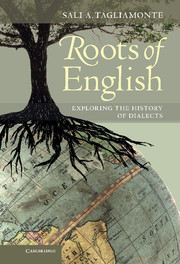Book contents
- Frontmatter
- Contents
- List of Figures
- List of Tables
- Preface
- Acknowledgements
- Abbreviations
- 1 Introduction
- 2 Dialects as a window on the past
- 3 The Roots Archive
- 4 Methods of analysis
- 5 Word endings
- 6 Joining sentences
- 7 Time, necessity and possession
- 8 Expressions
- 9 Comparative sociolinguistics
- 10 The legacy of British and Irish dialects
- Notes
- References
- Index
2 - Dialects as a window on the past
Published online by Cambridge University Press: 05 November 2012
- Frontmatter
- Contents
- List of Figures
- List of Tables
- Preface
- Acknowledgements
- Abbreviations
- 1 Introduction
- 2 Dialects as a window on the past
- 3 The Roots Archive
- 4 Methods of analysis
- 5 Word endings
- 6 Joining sentences
- 7 Time, necessity and possession
- 8 Expressions
- 9 Comparative sociolinguistics
- 10 The legacy of British and Irish dialects
- Notes
- References
- Index
Summary
Aye, you know, it’s good history here.
(Harry Caddell, 83, CLB)In this chapter, I deepen the argument that dialects in Northern Ireland, Lowland Scotland and northern England are a particularly important and interesting test site for the study of English. They also have implications for the study of language variation and change more generally. For simplicity, in this book I will refer to these dialects as ‘northern’ following a long line of researchers who have considered the northern climes of England, Lowland Scotland and Northern Ireland to be a broadly cohesive region in terms of language use (Beal, 1993, 1997; Wales, 2000).
There is extensive discussion in the literature about the so-called ‘north–south divide’ in Britain. The boundary where north begins and south ends differs depending on the point of view of the beholder and the chronological year. Moreover, the location of this watershed has changed from one time to the next (for lively discussion, see Wales, 2006). This is due, at least in part, to the fact that the dividing line between north and south is not definitive. Dialectologists differ in their views and so do laypeople. Moreover, the boundary seems to have moved further north in recent decades (Trudgill, 1990: 33–4, 63–5). This highlights the complex cultural base for any claims regarding a north–south dichotomy (Wales, 2006). Nevertheless, a general consensus arises suggesting that a gross southern British vs northern English distinction is reasonably valid (Montgomery, 2001: 145; Wales, 2006). As Weinreich (1954: 397) cogently argued, the study of borders and centres in dialectology is imminently linked to ‘culture areas’ and as Wales (2006: 24) contends, ‘Northern English is as much a cultural construct as it is a reality.’
Miners
But whippets and greyhounds, these were the kind of things miners had.
(William Burns, 82, CMK, 037)Thus, the long history of the British Isles presents a strong case for believing in a north–south dichotomy for the use of one form or another, or more important, as we shall see, a distinction in the relative frequencies of one form or another. An ideal means to test this is to conduct a comparison across representative dialects. The Roots Archive along with the British Dialects Archive permit investigation of north–south differences since they comprise two communities situated in the south and six in what can reasonably be construed to be ‘north’.
- Type
- Chapter
- Information
- Roots of EnglishExploring the History of Dialects, pp. 6 - 26Publisher: Cambridge University PressPrint publication year: 2012



